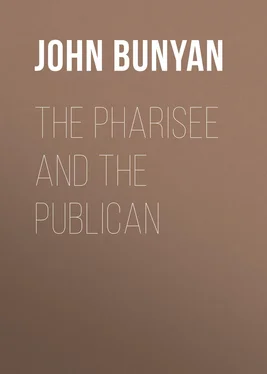John Bunyan - The Pharisee and the Publican
Здесь есть возможность читать онлайн «John Bunyan - The Pharisee and the Publican» — ознакомительный отрывок электронной книги совершенно бесплатно, а после прочтения отрывка купить полную версию. В некоторых случаях можно слушать аудио, скачать через торрент в формате fb2 и присутствует краткое содержание. Жанр: foreign_prose, foreign_religion, Философия, foreign_psychology, foreign_antique, на английском языке. Описание произведения, (предисловие) а так же отзывы посетителей доступны на портале библиотеки ЛибКат.
- Название:The Pharisee and the Publican
- Автор:
- Жанр:
- Год:неизвестен
- ISBN:нет данных
- Рейтинг книги:4 / 5. Голосов: 1
-
Избранное:Добавить в избранное
- Отзывы:
-
Ваша оценка:
- 80
- 1
- 2
- 3
- 4
- 5
The Pharisee and the Publican: краткое содержание, описание и аннотация
Предлагаем к чтению аннотацию, описание, краткое содержание или предисловие (зависит от того, что написал сам автор книги «The Pharisee and the Publican»). Если вы не нашли необходимую информацию о книге — напишите в комментариях, мы постараемся отыскать её.
The Pharisee and the Publican — читать онлайн ознакомительный отрывок
Ниже представлен текст книги, разбитый по страницам. Система сохранения места последней прочитанной страницы, позволяет с удобством читать онлайн бесплатно книгу «The Pharisee and the Publican», без необходимости каждый раз заново искать на чём Вы остановились. Поставьте закладку, и сможете в любой момент перейти на страницу, на которой закончили чтение.
Интервал:
Закладка:
I say, hypocrites love not to think of their sins, when they stand in the presence of God; but rather to muster up, and to present him with their several good deeds, and to venture a standing or falling by them.
2. This carriage of the Pharisee before God informs us, that moral virtues, and the ground of them, which is the law, if trusted to, blinds the mind of man that he cannot for them perceive the way to happiness. While Moses is read (and his law and the righteousness thereof trusted to), the vail is upon their heart; and even unto this day (said Paul) the vail remaineth “untaken away in the reading of the Old Testament, which vail is done away in Christ. But even unto this day, when Moses is read, the vail is upon their heart;” 2 Cor. iii. 14, 15. And this is the reason so many moral men, that are adorned with civil and moral righteousness, are yet so ignorant of themselves, and the way of life by Christ.
The law of works, and the righteousness of the flesh, which is the righteousness of the law, blinds their minds, shuts up their eyes, and causeth them to miss of the righteousness that they are so hotly in the pursuit of. Their minds were blinded, saith the text. Whose minds? Why those that adhered to, that stood by, and that sought righteousness of the law. Now,
The Pharisee was such an one; he rested in the law, he made his boast of God, and trusted to himself that he was righteous; all this proceeded of that blindness and ignorance that the law had possessed his mind withal; for it is not granted to the law to be the ministration of life and light, but to be the ministration of death, when it speaks; and of darkness, when trusted unto, that the Son of God might have the pre-eminence in all things: therefore it is said when the heart “shall turn to him, the vail shall be taken away;” 2 Cor. iii. 16.
3. We may see by this prayer, the strength of vain confidence; it will embolden a man to stand in a lie before God; it will embolden a man to trust to himself, and to what he hath done; yea, to plead his own goodness, instead of God’s mercy, before him. For the Pharisee was not only a man that justified himself before men, but that justified himself before God; and what was the cause of his so justifying himself before God, but that vain confidence that he had in himself and his works, which were both a cheat and a lie to himself? But I say, the boldness of the man was wonderful, for he stood to the lie that was in his right hand, and pleaded the goodness of it before him.
But besides these things, there are four things more that are couched in this prayer of the Pharisee.
1. By this prayer the Pharisee doth appropriate to himself conversion; he challengeth it to himself and to his fellows. “I am not,” saith he, “as other men;” that is, in unconversion, in a state of sin, wrath, and death: and this must be his meaning, for the religion of the Pharisee was not grounded upon any particular natural privilege: I mean not singly, not only upon that, but upon a falling in with those principles, notions, opinions, decrees, traditions, and doctrines that they taught distinct from the true and holy doctrines of the prophets. And they made to themselves disciples by such doctrine, men that they could captivate by those principles, laws, doctrines, and traditions: and therefore such are said to be of the sect of the Pharisees: that is, the scholars and disciples of them, converted to them and to their doctrine. O! it is easy for souls to appropriate conversion to themselves, that know not what conversion is. It is easy, I say, for men to lay conversion to God, on a legal, or ceremonial, or delusive bottom, on such a bottom that will sink under the burden that is laid upon it; on such a bottom that will not stand when it is brought under the touchstone of God, nor against the rain, wind, and floods that are ordained to put it to the trial, whether it is true or false. The Pharisee here stands upon a supposed conversion to God; “I am not as other men;” but both he and his conversion are rejected by the sequel of the parable: “That which is highly esteemed among men” (Luke xvi. 15) “is abomination in the sight of God.” That is, that conversion, that men, as men, flatter themselves that they have, is such. But the Pharisee will be a converted man, he will have more to shew for heaven than his neighbour—“I am not as other men are;” to wit, in a state of sin and condemnation, but in a state of conversion and salvation. But see how grievously this sect, this religion, beguiled men. It made them twofold worse the children of hell than they were before, and than their teachers were, Matth. xxiii. 15; that is, their doctrine begat such blindness, such vain confidence, and groundless boldness in their disciples, as to involve them in that conceit of conversion that was false, and so if trusted to, damnable.
2. By these words, we find the Pharisee, not only appropriating conversion to himself, but rejoicing in that conversion: “God, I thank thee,” saith he, “that I am not as other men;” which saying of his gives us to see that he gloried in his conversion; he made no doubt at all of his state, but lived in the joy of the safety that he supposed his soul, by his conversion, to be in. Oh! thanks to God, says he, I am not in the state of sin, death, and damnation, as the unjust, and this Publican is. What a strange delusion, to trust to the spider’s web, and to think that a few, or the most fine of the works of the flesh, would be sufficient to bear up the soul in, at, and under the judgment of God! “There is a generation that are pure in their own eyes, and yet are not washed from their filthiness.” This text can be so fitly applied to none as the Pharisee, and to those that tread in the Pharisee’s steps, and that are swallowed up with his conceits, and with the glory of their own righteousness.
So again, “There is a way” (a way to heaven) “which seemeth right to a man, but the end thereof are the ways of death;” Prov. xxx. 12; xiv. 12. This also is fulfilled in these kind of men; at the end of their way is death and hell, notwithstanding their confidence in the goodness of their state.
Again, “There is that maketh himself rich, yet hath nothing;” Prov. xiii. 7. What can be more plain from all these texts, than that some men that are out of the way think themselves in it; and that some men think themselves clean, that are yet in their filthiness, and that think themselves rich for the next world, and yet are poor, and miserable, and wretched, and blind, and naked. Thus the poor, blind, naked, hypocritical Pharisee thought of himself, when God threatened to abase him: yea, he thought himself thus, and joyed therein, when indeed he was going down to the chambers of death.
3. By these words, the Pharisee seems to put the goodness of his condition upon the goodness of God. I am not as other men are, and I thank God for it. “God (saith he), I thank thee, that I am not as other men are.” He thanked God, when God had done nothing for him. He thanked God, when the way that he was in was not of God’s prescribing, but of his own inventing. So the persecutor thanks God that he was put into that way of roguery that the devil had put him into, when he fell to rending and tearing of the church of God; “Their possessors slay them (saith the prophet), and hold themselves not guilty: and they that sell them say, Blessed be the Lord, for I am rich;” Zech. xi. 5. I remember that Luther used to say, “In the name of God begins all mischief.” All must be fathered upon God: the Pharisee’s conversion must be fathered upon God; the right, or rather the villany of the outrageous persecution against God’s people, must be fathered upon God. “God, I thank thee,” and, “Blessed be God,” must be the burden of the heretic’s song. So again, the free-willer, he will ascribe all to God; the Quaker, the Ranter, the Socinian, &c., will ascribe all to God. “God, I thank thee,” is in every man’s mouth, and must be entailed to every error, delusion, and damnable doctrine that is in the world: but the name of God, and their doctrine, worship, and way, hangeth together, as the Pharisee’s doctrine; that is to say, by nothing at all: for God hath not proposed their principles, nor doth he own them, nor hath he commanded them, nor doth he convey by them the least grace or mercy to them; but rather rejecteth them, and holdeth them for his enemies, and for the destroyers of the world.
Читать дальшеИнтервал:
Закладка:
Похожие книги на «The Pharisee and the Publican»
Представляем Вашему вниманию похожие книги на «The Pharisee and the Publican» списком для выбора. Мы отобрали схожую по названию и смыслу литературу в надежде предоставить читателям больше вариантов отыскать новые, интересные, ещё непрочитанные произведения.
Обсуждение, отзывы о книге «The Pharisee and the Publican» и просто собственные мнения читателей. Оставьте ваши комментарии, напишите, что Вы думаете о произведении, его смысле или главных героях. Укажите что конкретно понравилось, а что нет, и почему Вы так считаете.












